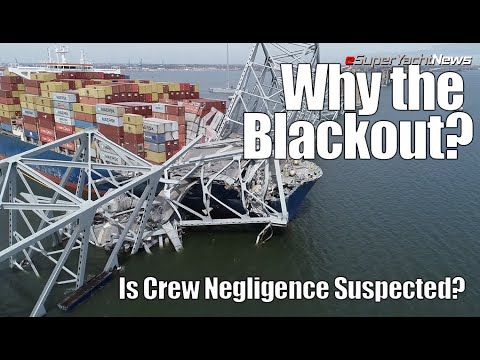The effects of the Baltimore bridge collapse will be horrific. Let me break it down.
If you missed it, the Francis Scott Key Bridge in Baltimore was destroyed by a cargo ship that lost power last night.
https://twitter.com/BNONews/status/1772515766929097088
Two people have been rescued from the water and crews are searching for others, including six missing construction workers and others who may be in submerged cars under 50 feet of water … with the tide starting to come back in.
https://twitter.com/simonateba/status/1772619773676806569
One of the two people rescued is currently in critical condition.
USA Today reports that this has brought the Port of Baltimore to a halt.
At least 40 ships are now more or less trapped inside the port, according to Reuters. At least 30 other ships planned to arrive there.
“They will likely have to reroute shipping to other ports on the East Coast,” said Kevin Linderman, a professor and supply chain expert at Pennsylvania State University. “However, this will put additional demand on these ports, and shippers may not be able to access US markets” as efficiently, he said.
“One critical question is, can the other ports handle the products that were destined to Baltimore?”
Similarly, Reuters says that the port “looks to be out of commission indefinitely.”
Besides the immediate loss of life, this accident will have long-lasting impacts on American shipping and supply chains … and no one is quite sure how bad it will be.
https://twitter.com/jimpfaff/status/1772601224358920390
Here are a few quick stats about the importance of the port from the State of Maryland:
The Port’s private and public terminals handled 847,158 autos and light trucks in 2023, the most of any U.S. port for the thirteenth straight year.
In 2023, the Port ranked first in the nation in handling automobiles, light trucks, farm and construction machinery, as well as imported sugar and gypsum. The Port ranked second in the country for exporting coal. In 2022, the Port ranked sixth for importing coffee, 119,000 tons worth $609 million.
You thought the car market was going to be a “bloodbath” if Biden’s EPA bans new gas cars by 2030? You haven’t seen anything yet!
Political jokes aside, the effects of this disaster will completely shift the way companies think about shipping and logistics (not to mention local and interstate commerce that used the bridge).
In Fiscal Year 2023, some 11.7 million tons of general cargo were handled by the Port’s public terminals, a new record from the 11.3 million tons set in 2022.
Moreover, in 2023, the Port of Baltimore handled a record 52.3 million tons of international cargo, valued at $80.8 billion. Nationally, Baltimore ranks 9th for both total dollar value and tonnage of international cargo.
The future of the struggling city of Baltimore is also up in the air.
Last year, Maryland Gov. Wes Moore praised the port in a press release, noting how many jobs it brings to the area.
The Port of Baltimore generates about 15,300 direct jobs, with nearly 140,000 jobs overall linked to Port activities. The port is first among the nation’s ports for autos and light truck volume, roll on/roll off farm and construction machinery, and imported gypsum and is responsible for nearly $3.3 billion in personal wages and salaries, $2.6 billion in business revenue and $395 million in state and local tax revenue annually.
Maryland is already facing a massive, growing deficit, and Baltimore makes up a large percentage of Maryland. WBFF Baltimore reports the estimates show a “structural deficit exceeding $1 billion dollars by the end of the decade.”
According to the report, Maryland will go into the red after the 2024 Fiscal Year.
In Fiscal Year 2025, [the Department of Legislative Services] predicts a structural budget deficit of $418 million dollars.
In Fiscal Years 2026 and 2027, DLS projects a deficit of $572 million and $328 million, respectively.
By the 2028 Fiscal Year, Maryland’s budget outlook “deteriorates substantially,” the report says, predicting a structural deficit of more than $1.8 billion dollars that year.
In addition, Maryland now ranks #1 in the nation for mortgage debt increase. From WBFF Baltimore:
A new study conducted by the personal-finance website WalletHub ranked Maryland #1 in adding the most mortgage debt from Q3 2023 to Q4 2023.
“Maryland residents added the most mortgage debt from Q3 2023 to Q4 2023, at least in percentage terms, with the average balance rising by 1.23% to $283,092,” says WalletHub Editor, John Kiernan. “No other state had an increase above 1%, and 17 states even saw decreases during Q4.”
Baltimore itself is struggling with crumbling infrastructure, failed schools, and crime:
Public urination is literally eroding Baltimore’s historic buildings and I don’t think I could come up with a better metaphor for the fall of civilization
When you think of a blue city, it’s easy to get caught up in the mass-looting, the violence, the corruption, the drugs, the homelessness, etc.
ZERO students at 13 Baltimore high schools test proficient in state math exams
Wow, this is troubling. Especially considering the fact that last year, Baltimore City Schools received $1.6 billion from taxpayers — the most they’ve received to date.
ZERO students at 13 Baltimore high schools test proficient in state math exams | Not the Bee
Gangs of teens are stealing cars left and right and Baltimore has finally decided to crack down … on the car manufacturers
Car thefts are a MAJOR problem in gang-infested US cities.
How will the complete shutdown of a port that employs 15,300 people directly and 140,000 overall affect a city of a half-million people like Baltimore? What about the loss of $400 million in taxes for a state that’s already facing a budget crisis?
And once businesses redirect their routes to different ports and work out the logistics, how many will come back to Baltimore in the years ahead?
It’s a sobering thought.
I’ll leave you with CNBC’s report:






